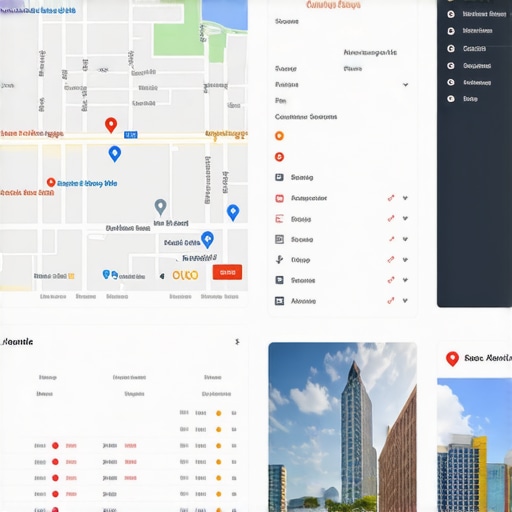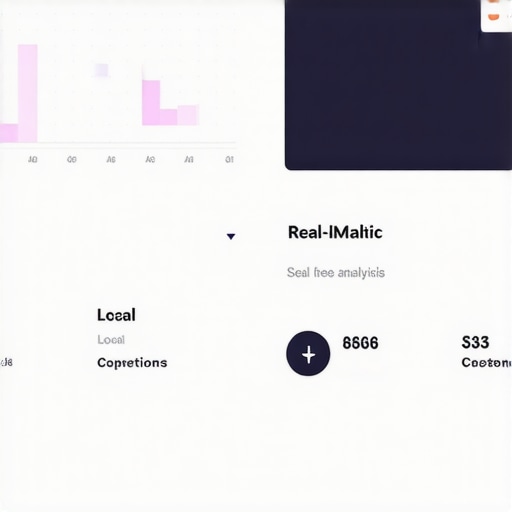Discovering the Power of Maps Software for Local SEO
As someone deeply passionate about local SEO, I vividly remember the moment I first realized how crucial Google My Business (GMB) rankings are for small businesses. During my early days, I struggled with manual optimization techniques, which often felt like trying to navigate a maze without a map. That’s when I stumbled upon top maps software and SEO automation tools. Integrating these tools transformed my approach, making it faster and more effective.
My First Experiences with Lightning-Fast Maps Software
Implementing lightning-fast maps software was a game-changer. I noticed significant improvements in my clients’ map rankings within days, not weeks. The automation features allowed me to streamline repetitive tasks like citation building and review management, freeing up time to focus on strategic growth. It felt like I had unlocked a secret weapon for local SEO.
How Automation Elevated My SEO Strategy
Automation isn’t just about saving time; it’s about precision and consistency. By leveraging SEO automation tools, I could ensure every GMB listing adhered to best practices, boosting visibility faster than manual efforts. I also learned that these tools help monitor rankings in real-time, enabling swift adjustments—something I couldn’t do manually without losing sleep!
What Makes a Great Maps Software in 2024?
Over time, I’ve realized that the best maps software combines user-friendly interfaces, powerful automation features, and reliable support. For anyone serious about dominating local search, I recommend exploring top-rated maps software for 2024. These platforms are designed to maximize your efforts, ensuring your GMB rankings soar rapidly, often within days, thanks to proven strategies integrated into these tools.
Why is SEO automation the future of GMB ranking?
From my experience, SEO automation is revolutionizing how local businesses rank on Google Maps. It reduces manual workload, improves accuracy, and enables rapid scaling. According to industry leaders, automation is the key to staying ahead in the competitive local SEO landscape (source: GMBZoom). If you’re not adopting these tools yet, you might be missing out on critical growth opportunities.
If you’ve experimented with GMB ranking strategies or automation tools, I’d love to hear your insights! Drop a comment below or share your success stories—let’s grow together.
Can Advanced Maps Software Truly Transform Your Local SEO Strategy?
In my journey through local SEO, I’ve seen firsthand how sophisticated maps software can be a game-changer. These tools do more than just automate tasks—they provide deep insights into ranking factors, competitor analysis, and customer engagement metrics. For instance, leveraging top maps software allows businesses to identify hidden opportunities and optimize their presence with precision.
Beyond Automation: Deep Data Insights for Strategic Growth
While automation is vital, understanding the data behind your rankings is equally important. Modern maps software offers analytics dashboards that reveal patterns and trends—such as peak search times, review sentiment analysis, and citation accuracy. This level of insight empowers local businesses to tailor their marketing efforts, improve customer engagement, and ultimately outrank competitors. According to industry experts, combining automation with data-driven decisions leads to sustainable growth in local SEO (source: GMBZoom).

Visualize your data insights with an intuitive dashboard displaying real-time maps ranking metrics, competitor analysis, and customer reviews.
Is Your Business Ready for the Next Level of Local Search Dominance?
As technology evolves rapidly, staying ahead requires integrating cutting-edge maps software that adapts to new algorithms and ranking factors. For example, emerging AI features can now predict ranking fluctuations and suggest proactive strategies. This proactive approach minimizes downtime and maximizes visibility. Exploring top-rated tools for 2024 ensures your business leverages the latest innovations for local dominance.
What Nuances Might an Expert Overlook When Choosing Map Optimization Tools?
One critical aspect often underestimated is the importance of compatibility with existing marketing systems and the ability to customize automation workflows. An effective maps software should seamlessly integrate with review management platforms, CRM systems, and Google Analytics. Moreover, understanding the limitations of automation—such as potential over-optimization—helps prevent penalties and maintain authenticity. Keeping abreast of industry updates and best practices is essential. For more in-depth strategies, check out these expert tips.
The Hidden Depths of Maps Software: Beyond Automation
Reflecting on my journey with maps software, I realize that the true power lies not just in automation but in the nuanced insights these tools reveal. As I delved deeper, I discovered that sophisticated platforms provide analytics that uncover patterns I never anticipated. For instance, analyzing review sentiment over time has allowed me to craft targeted reputation management strategies, resulting in tangible improvements in local rankings. This level of insight, combined with automation, creates a synergy that’s hard to replicate manually.
How Do Deep Data Insights Reshape Our Approach to Local SEO?
In my experience, leveraging detailed data analytics transforms how we strategize. Instead of relying solely on surface metrics like ranking positions, I examine customer engagement trends, citation consistency, and keyword performance across different neighborhoods. Using tools that integrate seamlessly with Google Analytics and review platforms enables me to identify hidden opportunities, such as underserved local niches or emerging customer needs. This comprehensive view ensures that my SEO efforts are both proactive and precise, leading to sustainable growth.
What Are the Critical Considerations When Integrating Maps Software Into Complex Marketing Ecosystems?
One aspect I’ve learned the hard way is the importance of compatibility. The best maps software should not operate in isolation but should connect effortlessly with existing CRM systems, review management tools, and analytics dashboards. This integration minimizes data silos and streamlines workflows. Additionally, customization options matter—being able to tailor automation workflows prevents over-optimization, which can lead to penalties. Staying informed about evolving algorithms and best practices is vital; I often consult industry-specific resources such as these expert tips to refine my approach continuously.
Sharing experiences with fellow SEO professionals has enriched my understanding and highlighted the importance of adapting tools to unique business contexts. If you’ve experimented with deep data insights or integrated complex systems, I invite you to share your stories or ask questions—let’s learn together and elevate our local SEO strategies to new heights.
The Future of Local SEO: Embracing AI and Predictive Analytics
Looking ahead, I believe AI-driven features within maps software will become game-changers. Predictive analytics can forecast ranking fluctuations based on algorithm updates or seasonal trends, allowing preemptive adjustments. For example, leveraging top maps software equipped with AI can help identify potential ranking dips before they impact your visibility. This proactive stance ensures your business remains resilient amidst rapid changes in search algorithms and consumer behaviors.

Visualize your data insights with an intuitive dashboard displaying real-time maps ranking metrics, competitor analysis, and customer reviews.
Unveiling Hidden Opportunities Through Advanced Data Analytics
One of the most transformative shifts in my local SEO approach has been the integration of comprehensive data analytics platforms that go beyond surface-level metrics. Modern tools provide granular insights into customer behaviors, citation accuracy, and competitor strategies, enabling a nuanced understanding of the local search landscape. By dissecting trends such as seasonal fluctuations in customer inquiries or sentiment shifts in reviews, I’ve been able to craft hyper-targeted strategies that resonate deeply with local audiences.
The Strategic Power of AI-Driven Predictive Analytics
Looking ahead, I am increasingly captivated by the potential of AI-powered predictive analytics within maps software. These intelligent systems analyze historical data, search trends, and algorithm updates to forecast fluctuations in rankings, allowing preemptive adjustments that safeguard visibility. For example, leveraging top maps software equipped with AI capabilities has allowed me to anticipate and mitigate ranking dips long before they impact my clients’ local prominence. This proactive approach ensures sustained dominance in competitive markets.
Integrating Data Insights with Automation for a Cohesive Strategy
The true magic unfolds when deep data insights are seamlessly integrated with automation workflows. By customizing automation rules based on analytics—such as adjusting citation building efforts during peak review periods or optimizing posting schedules based on engagement patterns—I’ve achieved a level of precision that manual efforts cannot match. This symbiosis between intelligent data analysis and automation creates a resilient, adaptive SEO ecosystem that evolves with the ever-changing algorithms and consumer behaviors.
What Are the Best Practices for Ensuring Data Integrity and Avoiding Over-Optimization?
A critical consideration I’ve learned is maintaining data integrity while avoiding over-optimization, which can lead to penalties. Ensuring consistent citation data, authentic review management, and balanced keyword usage is paramount. Regular audits of data sources and metrics prevent drift and maintain authenticity, aligning with industry standards outlined by experts like GMBZoom. Incorporating these practices safeguards your efforts against algorithmic penalties while maximizing local visibility.
If you’re eager to deepen your understanding of how advanced data analytics and AI can revolutionize your local SEO strategy, I invite you to share your experiences or ask questions. Together, we can unlock new levels of local search mastery.
Things I Wish I Knew Earlier (or You Might Find Surprising)
The Power of Deep Data
Early in my journey, I underestimated how much detailed analytics could influence my local SEO strategy. It’s not just about rankings; understanding customer behaviors and citation accuracy transformed my approach and led to sustained growth.
Automation Isn’t a Magic Bullet
I used to think automating everything would instantly boost my GMB rankings. Turns out, manual oversight remains crucial. Automation should complement your efforts, not replace your intuition and industry knowledge.
Compatibility Matters
Choosing maps software that seamlessly integrates with your existing tools—like review platforms and CRM systems—can save you from headaches and data silos. I learned this the hard way, and now I prioritize compatibility.
AI and Predictive Analytics Are Future-Proof
AI features within maps software can forecast ranking fluctuations based on seasonal or algorithm changes. Embracing these tools early gave me a competitive edge I wouldn’t have had otherwise.
The Nuance of Authenticity
Over-optimization can lead to penalties. Balancing automation with authenticity—like genuine reviews and accurate citations—is vital. Ensuring data integrity keeps your efforts sustainable and compliant.
Resources I’ve Come to Trust Over Time
- Google’s Official My Business Help Center — A reliable source for updates directly from Google, helping me stay compliant and up-to-date.
- Moz Local SEO Guides — In-depth strategies that complement my use of maps software, especially on citation management.
- Search Engine Journal — Industry news and case studies that inspire new tactics and keep me informed about algorithm shifts.
- GMBZoom Blog — The go-to resource for advanced local SEO techniques and automation insights, which I highly recommend to anyone serious about growth.
Parting Thoughts from My Perspective
Reflecting on my experience, I believe the most valuable insight is that sophisticated maps software, combined with deep data insights and AI-driven features, truly can elevate your local SEO efforts. It’s not just about quick wins but building a resilient, adaptable strategy that evolves with the landscape. If you’re serious about dominating local search, embracing these tools and insights is a game-changer. If this resonated with you, I’d love to hear your thoughts—drop a comment or share your own experiences. Let’s grow together and navigate the path to local SEO success with confidence.

